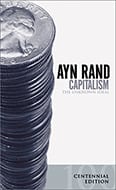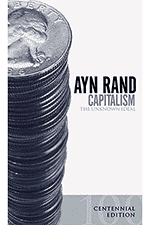This essay was first published in the September 1962 issue of The Objectivist Newsletter and later anthologized in Capitalism: The Unknown Ideal (1966 and 1967).
A talk based on the essay was delivered in November 1962 as a 26-minute radio address titled “The Foreign Policy of a Mixed Economy.”
America’s foreign policy is so grotesquely irrational that most people believe there must be some sensible purpose behind it. The extent of the irrationality acts as its own protection: like the technique of the “Big Lie,” it makes people assume that so blatant an evil could not possibly be as evil as it appears to them and, therefore, that somebody must understand its meaning, even though they themselves do not.
The sickening generalities and contradictions cited in justification of the foreign aid program fall roughly into two categories which are offered to us simultaneously: the “idealistic” and the “practical,” or mush and fear.
The “idealistic” arguments consist of appeals to altruism and swim out of focus in a fog of floating abstractions about our duty to support the “under-developed” nations of the entire globe, who are starving and will perish without our selfless help.
The “practical” arguments consist of appeals to fear and emit a different sort of fog, to the effect that our own selfish interest requires that we go bankrupt buying the favor of the “under-developed” nations, who, otherwise, will become a dangerous threat to us.
It is useless to point out to the advocates of our foreign policy that it’s either-or: either the “under-developed” nations are so weak that they are doomed without our help, in which case they cannot become a threat to us — or they are so strong that with some other assistance they can develop to the point of endangering us, in which case we should not drain our economic power to help the growth of potential enemies who are that powerful.
It is useless to discuss the contradiction between these two assertions, because neither of them is true. Their proponents are impervious to facts, to logic, and to the mounting evidence that after two decades of global altruism, our foreign policy is achieving the exact opposite of its alleged goals; it is wrecking our economy — it is reducing us internationally to the position of an impotent failure who has nothing but a series of compromises, retreats, defeats, and betrayals on his record — and, instead of bringing progress to the world, it is bringing the bloody chaos of tribal warfare and delivering one helpless nation after another into the power of communism.
When a society insists on pursuing a suicidal course, one may be sure that the alleged reasons and proclaimed slogans are mere rationalizations. The question is only: what is it that these rationalizations are hiding?
Observe that there is no consistent pattern in the erratic chaos of our foreign aid. And although in the long run it leads to the benefit of Soviet Russia, Russia is not its direct, immediate beneficiary. There is no consistent winner, only a consistent loser: the United States.
In the face of such a spectacle, some people give up the attempt to understand; others imagine that some omnipotent conspiracy is destroying America, that the rationalizations are hiding some malevolent, fantastically powerful giant.
The truth is worse than that: the truth is that the rationalizations are hiding nothing — that there is nothing at the bottom of the fog but a nest of scurrying cockroaches.
I submit in evidence excerpts from an article in the editorial section of The New York Times, of July 15, 1962, entitled: “Role of Foreign Lobbies.”
A “non-diplomatic corps” of foreign agents [states the article] has bloomed in recent years [in Washington] . . .
Lobbying in Congress to obtain — or prevent — the passage of legislation of interest to their foreign clients, seeking to pressure the Administration into adopting certain political or economic policies, or attempting to mold public opinion through a myriad of methods and techniques, this legion of special agents has become an elusive shadow for operating in Washington and the width and the length of the land.
All lobbyists, whether serving foreign or domestic interests, are required — by laws passed in the last three decades — to register with the government. The registrations have been growing at such a rate — with the foreign lobbyists outnumbering the domestic ones — that legislators are beginning to be alarmed. The Senate Foreign Relations Committee has announced that it is preparing an investigation of these foreign agents’ activities.
The New York Times article describes foreign lobbying as follows:
The theory behind this whole enterprise is that for a fee or a retainer and often for hundreds of thousands of dollars in advertising, publicity and expense money, a foreign government or a foreign economic or political interest can purchase a favorable legislation in the United States Congress, a friendly policy of the Administration or a positive image in the eyes of the American public opinion, leading in turn to profitable political or economic advantage. [Italics mine.]
Who are these lobbyists? Men with political pull — with “access” to influential Washington figures — American men hired by foreign interests. The article mentions that most of these men are “Washington lawyers” or “New York public relations firms.”
Russia is one of these foreign interests and is served by registered lobbyists in Washington; but she is merely cashing-in on the situation, like the others. The success of her conspiracy in this country is the result, not the cause, of our self-destruction; she is winning by default. The cause is much deeper than that.
The issue of lobbies has attracted attention recently through the struggle of foreign lobbyists to obtain sugar quotas from the American government.
Their efforts [states the article] were centered on Representative Harold D. Cooley, Democrat of North Carolina, chairman of the House Committee on Agriculture, who at least until this year held almost the complete power in the distribution of quotas. It has never been too clear what criteria Mr. Cooley used in allocating these quotas, and, by the same token, it is impossible to determine what was the actual effect of the lobbyists’ entreaties on him.
But in offering their services to foreign governments or sugar growers’ associations, these representatives were, in effect, offering for sale their real or alleged friendship with Mr. Cooley.
This is the core and essence of the issue of lobbying — and of our foreign aid — and of a mixed economy.
The trouble is not that “it has never been too clear what criteria Mr. Cooley used in allocating these quotas” — but that it has never been and never can be too clear what criteria he was expected to use by the legislation that granted him these powers. No criteria can ever be defined in this context: such is the nature of non-objective law and of all economic legislation.
So long as a concept such as “the public interest” (or the “social” or “national” or “international” interest) is regarded as a valid principle to guide legislation — lobbies and pressure groups will necessarily continue to exist. Since there is no such entity as “the public,” since the public is merely a number of individuals, the idea that “the public interest” supersedes private interests and rights can have but one meaning: that the interests and rights of some individuals take precedence over the interests and rights of others.
If so, then all men and all private groups have to fight to the death for the privilege of being regarded as “the public.” The government’s policy has to swing like an erratic pendulum from group to group, hitting some and favoring others, at the whim of any given moment — and so grotesque a profession as lobbying (selling “influence”) becomes a full-time job. If parasitism, favoritism, corruption, and greed for the unearned did not exist, a mixed economy would bring them into existence.
Since there is no rational justification for the sacrifice of some men to others, there is no objective criterion by which such a sacrifice can be guided in practice. All “public interest” legislation (and any distribution of money taken by force from some men for the unearned benefit of others) comes down ultimately to the grant of an undefined, undefinable, non-objective, arbitrary power to some government officials.
A man of clear-cut convictions is impervious to anyone’s influence. But when clear-cut convictions are impossible, personal influences take over. When a man’s mind is trapped in the foggy labyrinth of the non-objective, that has no exits and no solutions, he will welcome any quasi-persuasive, semi-plausible argument. Lacking certainty, he will follow anyone’s facsimile thereof. He is the natural prey of social “manipulators,” of propaganda salesmen, of lobbyists.
When any argument is as inconclusive as any other, the subjective, emotional, or “human” element becomes decisive. A harried legislator may conclude, consciously or subconsciously, that the friendly man who smiled at him at the cocktail party last week was a good person who would not deceive him and whose opinion can be trusted safely. It is by considerations such as these that officials may dispose of your money, your effort, and your future.
Although cases of actual corruption do undoubtedly exist among legislators and government officials, they are not a major motivating factor in today’s situation. It is significant that in such cases as have been publicly exposed, the bribes were almost pathetically small. Men who held the power to dispose of millions of dollars, sold their favors for a thousand-dollar rug or a fur coat or a refrigerator.
The truth, most likely, is that they did not regard it as bribery or as a betrayal of their public trust; they did not think that their particular decision could matter one way or another, in the kind of causeless choices they had to make, in the absence of any criteria, in the midst of the general orgy of tossing away an apparently ownerless wealth. Men who would not sell out their country for a million dollars are selling it out for somebody’s smile and a vacation trip to Florida. Paraphrasing John Galt: “It is of such pennies and smiles that the destruction of your country is made.”
The general public is helplessly bewildered. The “intellectuals” do not care to look at our foreign policy too closely. They feel guilt; they sense that their own worn-out ideologies, which they dare not challenge, are the cause of the consequences which they dare not face. The more they evade, the greater their eagerness to grasp at any fashionable straw or rationalization and to uphold it with glassy-eyed aggressiveness. The threadbare cloak of altruism serves to cover it up and to sanction the evasions by a fading aura of moral righteousness. The exhausted cynicism of a bankrupt culture, of a society without values, principles, convictions, or intellectual standards, does the rest: it leaves a vacuum, for anyone to fill.
The motive power behind the suicidal bleeding of the greatest country in the world is not an altruistic fervor or a collectivist crusade any longer, but the manipulations of little lawyers and public relations men pulling the mental strings of lifeless automatons.
These — the lobbyists in the pay of foreign interests, the men who could not hope to get, in any other circumstances, the money they are getting now — are the real and only profiteers on the global sacrifice, as their ilk has always been at the close of every altruistic movement in history. It is not the “under-developed” nations nor the “underprivileged” masses nor the starving children of jungle villages who benefit from America’s self-immolation — it is only the men who are too small to start such movements and small enough to cash in at the end.
It is not any “lofty ideal” that the altruism-collectivism doctrine accomplishes or can ever accomplish. Its end-of-trail is as follows:
A local railroad had gone bankrupt in North Dakota, abandoning the region to the fate of a blighted area, the local banker had committed suicide, first killing his wife and children — a freight train had been taken off the schedule in Tennessee, leaving a local factory without transportation at a day’s notice, the factory owner’s son had quit college and was now in jail, awaiting execution for a murder committed with a gang of raiders — a way station had been closed in Kansas, and the station agent, who had wanted to be a scientist, had given up his studies and become a dishwasher — that he, James Taggart, might sit in a private barroom and pay for the alcohol pouring down Orren Boyle’s throat, for the waiter who sponged Boyle’s garments when he spilled his drink over his chest, for the carpet burned by the cigarettes of an ex-pimp from Chile who did not want to take the trouble of reaching for an ashtray across a distance of three feet. (Atlas Shrugged)






